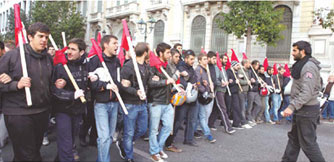Greeks suffer the wounds of austerity cuts
Updated: 2011-11-28 07:22
By Fu Jing (China Daily)
|
|||||||||
'Alarming worries'
"This is a decision our country should make soon," Kosta Makrhs said last week as students marched to the lower end of Syntagma Square, the plaza facing the Greek parliament.
Makrhs, who has daughters 16 and 9, and his cousin Angflo Drakos don't want to miss any protest, but they are not participants. With a shabby stall a block from the square, they sell bread to the protesters. "Not so many people come to buy, but demonstrations are walking fairs for us," says Makrhs, who can earn 25 cents for each piece of bread he sells at 50 cents.
Makrhs used to wait tables in a restaurant, but he lost his job last year when bleak business forced it to close. His wife still works in a furniture factory in Athens and earns about 1,100 euros a month. With his tiny income from selling bread, the family can barely make ends meet.
|
 Students march in Athens as the debt crisis worsens in Greece. Nearly 44 percent of 18- to 25-year-olds have no jobs. [Photo by Fu Jing/China Daily]
|
"There are many alarming worries in my country," Makrhs said. He is most concerned about the growing numbers of homeless and hungry people who roam the streets and the rising count of drug addicts and suicides.
According to official data cited by the Guardian newspaper in the United Kingdom, 5,000 suicides in Greece were reported in the first eight months this year, compared with 2,500 for all of last year. Idle people roam the streets of downtown Athens, and theft and robbery are rampant. Police and security guards are patrolling, but often are seen to continue their chatting and smoking after hearing a robbery call.
"These are alarming phenomena," Makrhs said.
Meanwhile, he said, the children have been severely affected by the austerity measures. For example, the salary of teachers at his daughters' school was reduced by half to 600 euros a month, and now the teachers don't show up sometimes. Textbooks used to be free; now there is a charge. And if his children get sick, he said, they must wait a month for treatment because the hospitals don't have enough hands.
"The government should correct these as quickly as possible," Makrhs said. Otherwise, he said, poor education will not prepare them to compete as adults in a world economy.
Time to move
Greece will strengthen the austerity measures required to meet the target of deficit reduction set by the EU, IMF and European Central Bank. They include additional wage cuts, pension cuts, layoffs for public sector employees and changes to collective bargaining rules to make it easier to hire and fire. Very soon, about 30,000 public servants will be laid off.
To avoid being further affected by the austerity that might last for years, many Greeks are choosing to return to rural areas, where they can maintain a better standard of living at less cost. And some people are fleeing to other countries where they can find jobs.
Malkit Singh, who moved to Greece from India 20 years ago, is one of them. Singh has driven a taxi in Athens for years, but he said business has dropped off markedly because others are out of work.
Fewer Greeks can afford to take taxis. And foreign investors and tourists hesitate to come to Athens because strikes and others protests often cause the cancellation of flights and ferry services and the closing of government offices and tourist sites. Because business is so poor, some taxi drivers take unnecessary detours to add distance, and thus money, to their fares.
|
 Even dogs get in the act. This sign reflects an old saying about victory in battle, or death. [Photo by Fu Jing/China Daily]
|
Singh said he is honest. But his net income has dropped from 80-100 euros a day to 15-20 euros. And he has to work 11-13 hours every day. He says it is not true, as some people say, that Greeks are enjoying more leisure than other parts of the world.
"For us ordinary people, it is never the case," Singh said. "Now that survival has turned out to be too hard here, I cannot see any hope."
Singh said he wants to open a shop to sell Chinese goods in his home country, and is sounding out his relatives in India about the possibility.










